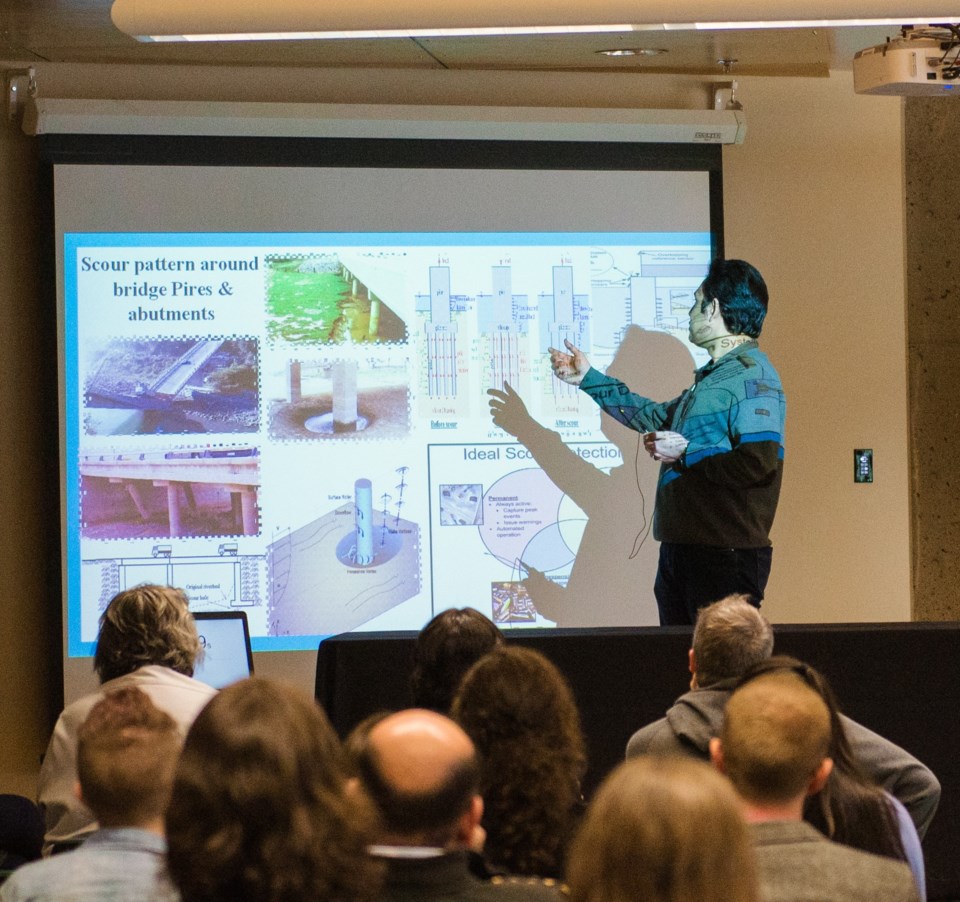Call it the academic version of the elevator pitch.
Seven University of Northern British Columbia graduate students tested their ability Wednesday to explain their research in terms almost anyone could understand - and do it within the span of just three minutes.
Part of this week's showcasing of research at the school, they participated in a 3-Minute Thesis competition. Also known as 3MT, it's a friendly competition that originated at the University of Queensland in Australia about a decade ago and has since gone worldwide.
Aided by nothing more than their voices and a single slide summarizing their study flashed up on a screen behind them, they gave their presentations before a panel of three judges and about 25 onlookers.
In the process, they provided glimpses into a range of topics - from the response of the Cheslatta First Nation to the 1952 flooding of the Nechako headwaters, to the effects of scour patterns on bridge abutments to the use of hospices by residents in long-term care homes.
Jennifer Coburn, a masters candidate in Gender Studies, emerged the winner for her presentation entitled The "Girl Push-Up:" The Effects of Gender Stereotypes on Women's Competence and Participation in Physical Activity.
She made a point of getting out from behind the podium and speaking without notes. And Coburn started by giving her audience a mental image, asking them to imagine she is standing on a baseball field and about to throw a ball when the phrase 'throw like a girl' pops into her head.
"I know that if I mess up in front of everyone else, they will think that women are bad at throwing. So what happens when I throw that ball? Well, I throw terribly and I end up confirming that stereotype."
Coburn goes on to explain the concept of "stereotype threat" - in which a fear of poor performance only increases the odds of failure and, in turn, "is used to justify the stereotype."
Her slide depicted images of singer Carly Rae Jepson throwing a flummoxed ceremonial pitch at a Major League Baseball game and a woman performing a so-called "girl pushup" where her knees on the ground and a man doing a regular pushup.
Coburn's work is centred on experiments testing whether telling a woman she is capable only of the "girl pushup" affects her performance.
Coburn said she worked on her presentation over the course of at least month, going through on different scripts and slides and practicing her pitch.
"Every day I'd spend about 10 to 20 minutes running through my presentation," Coburn said.
UNBC chemistry professor Todd Whitcombe, Aboriginal Learning Centre manager Bev Best and alumni relations officer Kirk Walker were the judges.
Articulation, engagement and clarity were some of the factors they took into consideration.
Walker said he was impressed by Coburn's TED Talk style. The key for Best was simply whether they communicated clearly and left her interested and wanting to hear more.
"It's really important because it also speaks to how much they're engaged with their own research," Best said. "If they can engage us in three minutes, that means they are very highly invested in their own research and passionate about it."
Whitcombe suggested all graduate students will face their own form of the 3MT at some point.
"Everybody has to write an abstract for their thesis," he said. "You have to write a one page summary of what your thesis is about and try and encapsulate 200 pages - well that's what this is."
Coburn won $750 and advanced the 3MT western regional finals on April 17, which will also be held at the UNBC.
Nursing student Ali Marleau was the runner up for her presentation on how people with a heart condition known as atrial fibrillation manage their risk for strokes that comes with it and came away with $500.
Natural Resources and Environmental Studies student David Breault was the people's choice winner for his presentation on the ecology of the marten on Haida Gwaii and earned $250.



